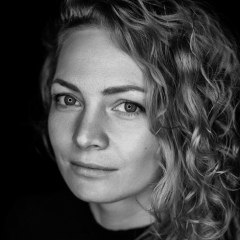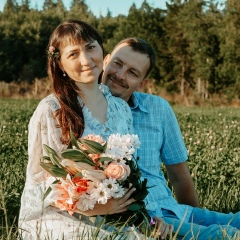О разнообразии путей индивидуации
"Союз мужчины и женщины, существующий до самой смерти, может толковаться как особый путь индивидуации. Одной из существенных черт этого пути счастья является невозможность избежать друг друга. Так же как отшельник не может уклониться от запросов своей души, так и супругам не удасться игнорировать своего партнера. В этой отчасти возвышенной, отчасти мучительной реальности и заключена специфика подобного пути.
В христианском представлении счастья важную роль играет любовь. До сих пор мы почти не упоминали об этом чувстве.
Слово "любовь" охватывает различные феномены, но все они, вероятно, имеют один и тот же источник, хотя и отличаются друг от друга. Брак — один из способов познания любви, которая, однако, далеко не всегда идентична тому, что вытворяет ветреный младенец Купидон. От нее можно ожидать всяких неожиданностей, она капризна, необузданна. Любовь в браке характерна еще и своей "противоестественной" долговечностью… Существуют пожилые супружеские пары, в которых один из партнеров здоров и бодр, а другой болен и пребывает в унынии. Тем не менее оба любят друг друга и, заметьте, не из сострадания или потребности в защите. В таких случаях проявляет себя вся противоестественность и все величие этого вида любви, который выходит за пределы "личных отношений", становится чем-то большим, чем просто отношения.
Любой человек ищет свой собственный путь счастья. Художник находит его в живописи, монах — в монастырских заботах, инженер — в строительстве электростанций и т. д. Но часто люди идут по неподходящему для них пути счастья. Многие хотят быть художниками, а затем обнаруживают, что их призвание в другом.
Но является ли брак общедоступным путем счастья? Разве не существуют люди, душевному развитию которых не поспособствовал брак? Мы не требуем от каждого, чтобы он находил свое счастье, скажем, в музыке. Почему же мы считаем, что любой человек найдет себя в браке?"
"Союз мужчины и женщины, существующий до самой смерти, может толковаться как особый путь индивидуации. Одной из существенных черт этого пути счастья является невозможность избежать друг друга. Так же как отшельник не может уклониться от запросов своей души, так и супругам не удасться игнорировать своего партнера. В этой отчасти возвышенной, отчасти мучительной реальности и заключена специфика подобного пути.
В христианском представлении счастья важную роль играет любовь. До сих пор мы почти не упоминали об этом чувстве.
Слово "любовь" охватывает различные феномены, но все они, вероятно, имеют один и тот же источник, хотя и отличаются друг от друга. Брак — один из способов познания любви, которая, однако, далеко не всегда идентична тому, что вытворяет ветреный младенец Купидон. От нее можно ожидать всяких неожиданностей, она капризна, необузданна. Любовь в браке характерна еще и своей "противоестественной" долговечностью… Существуют пожилые супружеские пары, в которых один из партнеров здоров и бодр, а другой болен и пребывает в унынии. Тем не менее оба любят друг друга и, заметьте, не из сострадания или потребности в защите. В таких случаях проявляет себя вся противоестественность и все величие этого вида любви, который выходит за пределы "личных отношений", становится чем-то большим, чем просто отношения.
Любой человек ищет свой собственный путь счастья. Художник находит его в живописи, монах — в монастырских заботах, инженер — в строительстве электростанций и т. д. Но часто люди идут по неподходящему для них пути счастья. Многие хотят быть художниками, а затем обнаруживают, что их призвание в другом.
Но является ли брак общедоступным путем счастья? Разве не существуют люди, душевному развитию которых не поспособствовал брак? Мы не требуем от каждого, чтобы он находил свое счастье, скажем, в музыке. Почему же мы считаем, что любой человек найдет себя в браке?"
On the variety of ways of individuation
"The union of a man and a woman, existing until death, can be interpreted as a special path of individuation. One of the essential features of this path of happiness is the inability to avoid each other. Just as a hermit cannot evade the needs of his soul, so spouses cannot ignore their This partly sublime, partly painful reality contains the specificity of such a path.
In the Christian concept of happiness, love plays an important role. Until now, we have hardly mentioned this feeling.
The word "love" encompasses various phenomena, but they all probably have the same source, although they differ from each other. Marriage is one of the ways of knowing love, which, however, is not always identical to what the windy baby Cupid does. You can expect all sorts of surprises from her, she is capricious, unbridled. Love in marriage is also characterized by its "unnatural" longevity ... There are elderly couples in which one of the partners is healthy and vigorous, while the other is sick and depressed. However, both love each other and, mind you, not out of compassion or need for protection. In such cases, all the unnaturalness and all the greatness of this kind of love, which goes beyond the limits of "personal relationships", becomes something more than just a relationship.
Anyone is looking for their own path of happiness. The artist finds it in painting, the monk in the monastic cares, the engineer in the construction of power plants, etc. But often people follow the path of happiness that is not suitable for them. Many people want to be artists and then find that their calling is different.
But is marriage a publicly available path to happiness? Aren't there people whose spiritual development has not been facilitated by marriage? We do not require everyone to find their happiness, say, in music. Why do we believe that anyone will find themselves in marriage? "
"The union of a man and a woman, existing until death, can be interpreted as a special path of individuation. One of the essential features of this path of happiness is the inability to avoid each other. Just as a hermit cannot evade the needs of his soul, so spouses cannot ignore their This partly sublime, partly painful reality contains the specificity of such a path.
In the Christian concept of happiness, love plays an important role. Until now, we have hardly mentioned this feeling.
The word "love" encompasses various phenomena, but they all probably have the same source, although they differ from each other. Marriage is one of the ways of knowing love, which, however, is not always identical to what the windy baby Cupid does. You can expect all sorts of surprises from her, she is capricious, unbridled. Love in marriage is also characterized by its "unnatural" longevity ... There are elderly couples in which one of the partners is healthy and vigorous, while the other is sick and depressed. However, both love each other and, mind you, not out of compassion or need for protection. In such cases, all the unnaturalness and all the greatness of this kind of love, which goes beyond the limits of "personal relationships", becomes something more than just a relationship.
Anyone is looking for their own path of happiness. The artist finds it in painting, the monk in the monastic cares, the engineer in the construction of power plants, etc. But often people follow the path of happiness that is not suitable for them. Many people want to be artists and then find that their calling is different.
But is marriage a publicly available path to happiness? Aren't there people whose spiritual development has not been facilitated by marriage? We do not require everyone to find their happiness, say, in music. Why do we believe that anyone will find themselves in marriage? "
У записи 1 лайков,
0 репостов.
0 репостов.
Эту запись оставил(а) на своей стене Елена Владимирова






















